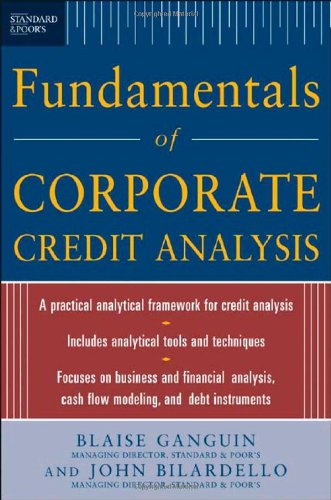Standard & Poor's Fundamentals of Corporate Credit Analysis epub
Par cole melvin le mercredi, janvier 18 2017, 09:37 - Lien permanent
Standard & Poor's Fundamentals of Corporate Credit Analysis. Blaise, Ganguin

Standard.Poor.s.Fundamentals.of.Corporate.Credit.Analysis.pdf
ISBN: 0071454586, | 463 pages | 12 Mb

Standard & Poor's Fundamentals of Corporate Credit Analysis Blaise, Ganguin
Publisher: McGraw-Hill
A simple analysis of the company's initial ratings of debt offerings compared to later ratings of the same offerings would probably show a pattern of nothing but no changes or downgrades. Fitch Ratings recently (November 6, 2012) upgraded Turkey's long-term foreign currency credit rating to Investment Grade, “BBB-“, which is great news. So far, May 2013 has been a gambler's paradise, in which a whopping 76.9% of the trading days for the S&P 500 have been up: The chart below shows just how far 2013's up day percentage exceeds previous years:. While S&P, Moody's and the other mainstream ratings agencies have done a pretty good job on corporate and municipal debt ratings over the past century and more, when it comes to sovereigns and other highly politicized situations, their records are rather poor, if you'll forgive the But in the world of sovereign debt, S&P is forced to evaluate many more subjective facts than are involved in a simple analysis of the probability of default of, say, General Electric or IBM. In this article, I argue that there is a high probability that Turkey will receive an upgrade from S&P or Moody's, therefore achieve a “real” investment grade status “if” the CDS spreads for 5 year Turkish Government Bonds (currently 1.27%) fall below 110 basis points (1.1%). Let's call this “fundamental analysis”. Although not a downgrade, it is a shock for an emerging market leader whose economic fundamentals have been improving so consistently in recent years that the upward trend was almost taken for granted. S&P issued credit ratings on more than $2.8 trillion of residential mortgage-backed securities and about $1.2 trillion of collateralized-debt obligations from September 2004 through October 2007, according to the complaint. The research firm has a negative fundamental outlook for the homebuilding sub-industry for the next 12 months and has an Underweight rating on ITB. FEATURED Standard & Poor's Fundamentals of Corporate Credit Analysis. S&P Capital IQ equity analyst Michael Souers "believes most publicly traded builders are in a stable competitive position after cutting costs, retiring debt and growing cash positions," according to a new research note issued by the firm.